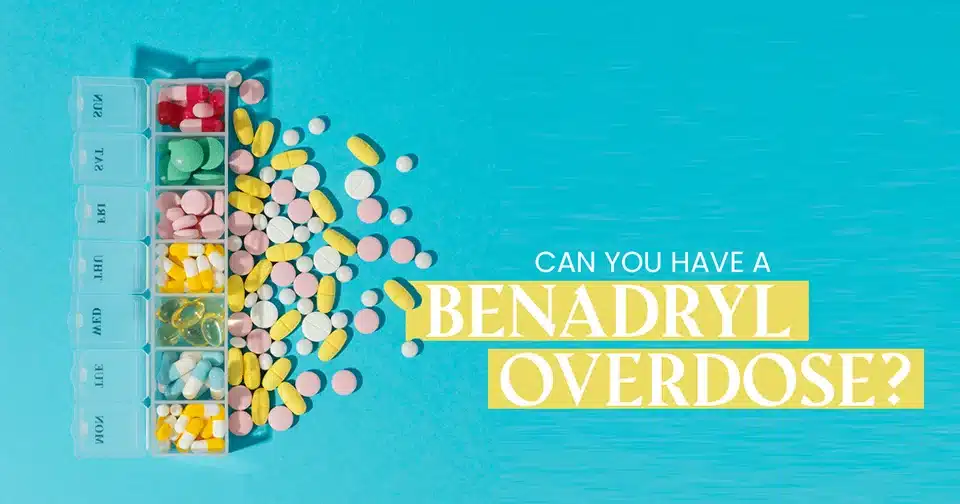While it’s not especially common to die from a Benadryl overdose, it’s certainly possible to take too much of this over-the-counter (OTC) antihistamine. In 2020, a dangerous social media challenge was going on that involved taking high doses of the medicine dubbed the “Benadryl Challenge.”
We’ll talk more about that viral and harmful trend after going more into how Benadryl works and what the potential side effects can be if you take too much.
How Does Benadryl Work?
Benadryl is an over-the-counter medicine, meaning you can buy it at a pharmacy without a prescription. The medicine is classified as one of the first-generation antihistamines. Antihistamines like oral Benadryl help with allergies.
Sometimes, they’re also taken off-label to help with other issues like anxiety and stomach problems. Second-generation antihistamines may have fewer side effects than older options like Benadryl.
The medications primarily help treat conditions caused by too much histamine. Histamine is a chemical your body’s immune system makes.
Allergies, including seasonal allergies and indoor allergies, happen when your immune system overreacts to what it sees as a foreign substance, such as pollen. When your body overreacts to certain things, it triggers to release of histamine. Histamine plays a role in inflammation, affects your intestines, and stimulates gastric acid secretion. The substance causes your body’s vessels to swell and then dilate, which is why you might experience common allergy symptoms.
Benadryl and other antihistamines help with congestion and coughing, wheezing and shortness of breath, itchy skin, watery eyes, and a runny nose.
Benadryl is a brand name. The generic ingredient diphenhydramine is what’s in Benadryl.
When you take diphenhydramine, it blocks your body’s production of histamine. The effects of antihistamines also include drying, which you may notice as a reduction in your runny nose or watery eyes. This may be due to the blocking of the production of another substance your body makes—acetylcholine.
For mild symptoms, Benadryl tends to be an effective medication.
While when used as directed and you follow the recommended dosage, Benadryl is considered relatively safe, it’s not medicine you should take every day. If you get into a habit of taking it every day for allergic symptoms or other symptoms, it can cause drowsiness, urinary retention, and confusion.
There’s also a relatively recent study showing that long-term, frequent use of antihistamines could increase the risk of dementia and Alzheimer’s in older people.
Along with the symptoms of allergies, Benadryl may help with symptoms of motion sickness, symptoms of the common cold, skin rash, and it is used as a sleep aid for short-term use because of the sedative effects.
Topical Benadryl is available as primarily an anti-itch medicine that may help with skin allergies, rashes, insect bites, and bee stings.
Benadryl Common Side Effects
Some of the most common adverse effects of taking this antihistamine can include:
- Drowsiness
- Dry mouth
- Headache
- Dizziness
- Weakness
Severe symptoms that indicate a potential medical emergency after taking the medicine include:
- Reduced memory
- Abnormal movements
- Impairment in thinking
- Confusion
- Dementia
- Fast heartbeat
- Seizure
Long-term side effects of using antihistamines can include:
- Blurred vision
- Memory problems
- Anxiety
- Dependence
- Constipation
The risks of side effects from a diphenhydramine product can be more significant if you combine it with alcoholic beverages, other medicines, or herbal products. Drug interactions can make severe drowsiness and other side effects more likely, or more pronounced.

Can You Overdose on Benadryl?
A Benadryl overdose is possible, although relatively uncommon. Drug overdose deaths from Benadryl aren’t common either, but can and do happen.
What happens if you overdose on Benadryl? If you were to overdose on diphenhydramine, the active ingredient, some of the potential side effects could include:
- Inability to urinate
- Very dry eyes
- Extreme drowsiness
- Stomach pain
- Blurred vision
- Dry mouth
- Large pupils
- Ringing in the ears
- Low blood pressure
- Rapid heartbeat or changes in heart rate
- Cardiac arrest
- Confusion
- Agitation
- Seizures
- Delirium
- Hallucinations
- Nervousness
- Tremors
- Lack of coordination
- Dry or red skin
- Nausea and vomiting
If you believe that you or someone else overdosed on a diphenhydramine product, you should get emergency medical attention or contact the Poison Control Center. If you go to the emergency room, you should try to provide the time the medicine was taken, how much was taken, and the strength if known.
If someone survives antihistamine toxicity in the first 24 hours, they’re likely to recover. There can be permanent damage in some cases, though.
For example, some people may develop pneumonia or brain damage from a lack of oxygen, which is among the potentially dangerous side effects of overdosing on different types of antihistamines.
Also, while death from an antihistamine overdose is rare, it can cause disturbances in the heart rhythm, which can be deadly.
What is the Benadryl Challenge?
Unfortunately, social media platforms can spawn very risky trends, particularly among teens and young people. One of those that picked up steam in 2020 was the Benadryl challenge.
Made popular on TikTok, the Benadryl Challenge suggests taking very high doses of the medication. Sometimes, people take as much as ten times the typical dosage. The goal of these dangerous activities is to create changes in mental status, like hallucinations or a “trip”
After the beginning of the TikTok challenge, there were reports of young people ending up hospitalized or dying as a result.
The U.S. Food and Drug Administration (FDA) issued a public warning on the topic and potential accidental or fatal overdose.
The FDA said taking higher-than-recommended doses of diphenhydramine has the potential to lead to serious heart problems, seizures, coma, or death, even in otherwise young and healthy people.
OTC Drug Abuse
Diphenhydramine isn’t the only of the over counter medication option with abuse potential. There’s often the misconception that if something is available over-the-counter or is medicine in general that somehow it’s safe to take. While this is largely true, there are certainly exceptions. Some of the deadliest substances right now are prescription drugs.
OTC drugs can, in some cases, be even more dangerous than other types of drugs simply because of how accessible and available they are, including to teens and young people.
Cold and Cough Medicines
The most frequently abused OTC medicines are cold products and cough medicines with dextromethorphan. Often referred to as DXM, the ingredient helps treat cold and flu symptoms and allergies. DXM can have psychoactive effects when large doses are frequently taken, similar to ketamine and PCP. Taking high doses is a very hazardous activity.
Some of the side effects of large doses of DXM include:
- Nausea
- Vomiting
- Hot flashes
- Sweating
- Loss of coordination
- Paranoia
- Panic attacks
- Slurred speech
- Lethargy
- Liver damage
- Damage to the brain
- Psychological and emotional issues
Stimulants
Stimulants are OTC medicines that include diet pills, caffeine pills, and decongestants. Overdose symptoms of OTC stimulants can consist of:
- Increased risk of heart attack or stroke
- Gastrointestinal problems
- Damage to the liver or kidneys
- Dehydration
- Hallucinations
- Delusions
- Anxiety
- Depression
Decongestant medicines may have stimulants like pseudoephedrine and methylphedrine. These stimulants can lead to heart problems, seizures, and hallucinations. Some OTC stimulants are used to make the illicit drug methamphetamine or meth.
Pain Medicines
Pain medications like acetaminophen aren’t purposely abused as often as DXM or stimulants, but there are serious risks associated if high doses are taken. For example, acetaminophen at high doses can cause liver damage or failure, kidney damage, or heart-related complications.
Key Takeaways
The possibility of risks stemming from both over-the-counter and prescription medicine is something for young people and parents to stay vigilant about. Don’t assume a medicine is safe simply because it doesn’t require a prescription.
With that in mind, a Benadryl or diphenhydramine overdose is not only possible but was the subject of a TikTok challenge that landed young people in the emergency department. Be mindful of the risks of all medicines and how accessible they might be if you have teens or young people in the house.
To learn more about treatments for over-the-counter substance abuse, call Opus Health at 855-953-1345 today!




